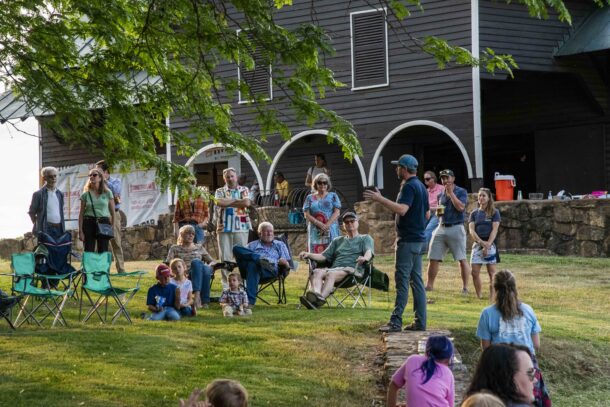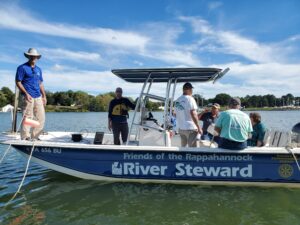 This year has brought significant growth in staff and project capacity for the tidal office based in Tappahannock. For years the office was staffed by a Lower River Steward and periodically by an educator from the education staff. With minimal support, our staff did an excellent job maximizing our capacity by utilizing the partnerships that had been formed over years of work. The challenging job of serving five plus counties was made even more challenging when the COVID pandemic surfaced and the world came to a standstill. All education programs immediately stopped and government offices closed thus limiting the work that could be done.
This year has brought significant growth in staff and project capacity for the tidal office based in Tappahannock. For years the office was staffed by a Lower River Steward and periodically by an educator from the education staff. With minimal support, our staff did an excellent job maximizing our capacity by utilizing the partnerships that had been formed over years of work. The challenging job of serving five plus counties was made even more challenging when the COVID pandemic surfaced and the world came to a standstill. All education programs immediately stopped and government offices closed thus limiting the work that could be done.
At the beginning of December 2021, FOR’s Tidal office operating out of June Parker Marina in Tappahannock, VA was down to a single part time position. With every challenge there is an opportunity. As an organization we recognized the greater need of strong staff support in our Northern Neck and Middle Peninsula counties. Over the course of the year, we were able to invest in the office by developing a Tidal Programs Manager role, and hiring a full time river steward, three educators, and developing our restoration technician’s role into a full time Oyster Restoration Specialist position.
With this increase in staff, we needed a larger space to operate. We have recently moved part of our operations into a new space at St Margaret’s School and are working with their staff and students to support river-centric programming such as field trips and water quality testing. We continue to utilize the office at June Parker Marina as the centerpiece of our restoration efforts.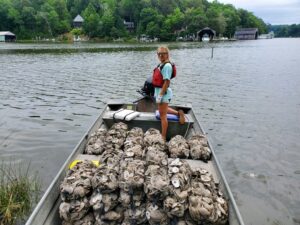
One of the main goals we are working towards in this region is returning the oyster population to its historical levels. The Rappahannock River is well known for having some of the finest tasting oysters in the Chesapeake Bay region. Oyster populations crashed due to overharvesting, disease, and pollution. With the creation of the triploid oyster and Chesapeake Bay WIP cleanup goals, the oyster is experiencing a renaissance. Thanks to this
revival and increases in funding for oyster restoration and aquaculture, FOR is increasing our oyster restoration and shell recycling efforts. Already existing partnerships such as Restore Urbanna Creek, Clean Carters Creek and Chesapeake Bay Foundation’s oyster gardeners program and past funding from others allowed us to apply for grants solely dedicated to oyster restoration and outreach. With this funding we have formed the Rappahannock River Oyster Restoration Partnership with the goal to restore 20 acres of reef in the next 2 years. In addition we are continuing expanding our oyster shell recycling program to more restaurants and pick up spots.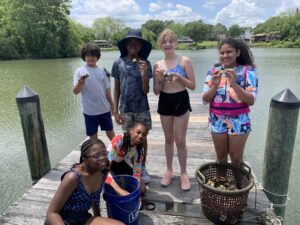
With the reopening of schools from COVID restrictions our educators have been able to re-engage students and teachers. Between field trips at Menokin and Belle Isle State Park, in class lessons throughout the watershed and increased partnerships with Essex County Schools, our staff is busy educating students and adults throughout the watershed. FOR was also able to work with partners at the Hanover/Caroline SWCD to write environmental literacy plans for Caroline, Essex and Middlesex County public schools. We continue to work with the Urbanna Marine Education program and schools such as Aylett CDS, Chesapeake Academy and the Chesapeake Bay Governor’s School. In June we closed out a 3 year grant from the EPA Office of Environmental Education with $25,000 in subgrants awarded to area schools and organizations for EE related programming and projects. These programs and partnerships are essential for supporting environmental education in the region.
In August we launched a new partnership with the Nature Conservancy (TNC) to increase voluntary, non-tidal wetland restoration efforts in the lower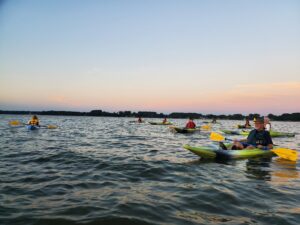 Rappahannock watershed with the hiring of River Steward, Libby Bieri. Part of Libby’s job will be to conduct grassroots outreach to landowners and identify likely areas for wetland restoration. She will work with TNC to identify at least 10 landowners interested in pursuing wetland restoration projects of more than 200 acres in total and advertise underutilized restoration programs such as Wetland Reserve Easements administered by NRCS.
Rappahannock watershed with the hiring of River Steward, Libby Bieri. Part of Libby’s job will be to conduct grassroots outreach to landowners and identify likely areas for wetland restoration. She will work with TNC to identify at least 10 landowners interested in pursuing wetland restoration projects of more than 200 acres in total and advertise underutilized restoration programs such as Wetland Reserve Easements administered by NRCS.
In addition, we continue to work with localities and partners across the Northern Neck, Middle Peninsula and the state on a broad range of agricultural and residential projects.
While we are proud of what 2022 has brought, it is only the beginning!
Written by Tidal Programs Manager Brent Hunsinger.
Last Modified: Nov. 2022

